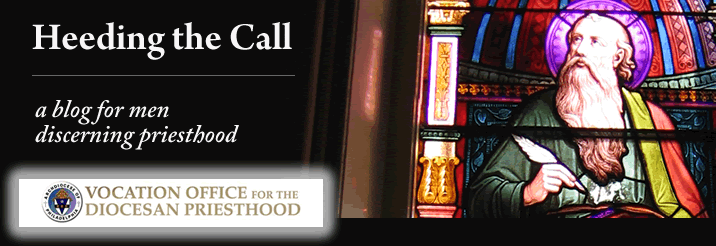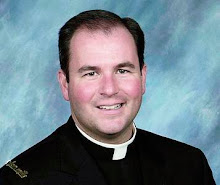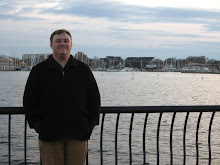Dear friends in Christ,
Being in my position, the notion of priestly vocations is something that is always on my mind. Mostly, I try to think of and develop ways for boys and men to encounter the living God, for it is through an intimate encounter with God that they start developing the notion of vocation. Vocation is a gift and a calling from God, and every person reading this blog has a vocation, because everybody is called by God to a life of holiness. This is the foreground to the Universal Call to Holiness. We believe that every person has the ability to cooperate with the grace of God to attain sanctity and zeal for the Gospel.
My job also moves me to consider deeper the notion of vocation. It is all well and good to develop programs designed to help men find their vocations, whatever it may be. There also needs to be a teaching and catechetical aspect when talking about vocations. The honest truth is that most Catholics probably do not know what a priest does from day to day. The average Catholic knows that Father Smith celebrates Mass on Sunday, but what does Father Smith do the rest of the days? Further, why does Father Smith celebrate Mass on Sunday?
I offer then, a little meditation on the role of the Eucharist in the life of a priest, and the role of the priest in the life of the Eucharist. Our late Holy Father, Pope John Paul II, wrote an annual letter to priests on Holy Thursday. The following passage is from the 1980 letter
Dominicae Cenae, or "The Lord's Supper":
"Through our ordination- the celebration of which is linked to the holy Mass from the very first liturgical evidence- we are united in a singular and exceptional way to the Eucharist. In a certain way we derive from it and exist for it. We are also, and in a special way, responsible for it- each priest in his own community and each bishop by virtue of the care of all the communities entrusted to him, on the basis of the solicitude omnium ecclesiarum that St. Paul speaks of" (1980 Letter Dominicae Cenae).
One of the essential elements that the Holy Father is getting at is the reciprical dependence of the priest on the Eucharist, and the Eucharist on the priest. The foremost reason for the priest is for the Eucharist, that life giving Bread, which, at the Last Supper, Jesus instituted. The Eucharist is truly the Body and Blood of Christ, but NOT in a symbolic way. The Eucharist is truly Jesus. The primary responsbility of the priest is to bring Christ to people, and he does this in a very literal way at Mass, since it is the priest who brings Christ into the world at the Eucharistic Consecration. He then gives Jesus to his flock, nourishing them, but not in an earthly way, but rather in a non temporal, heavenly way. For the Eucharist is truly bread from heaven (See John 6). In fact, I would say that the primary responsibility of the priest is to offer the holy sacrifice of the Mass, since it is through the celebration of Mass that results in the remission of sin. The Eucharistic Celebration is the Source and Summit of the Christian Life (See Lumen Gentium 11). Since the Eucharist is the Source and Summit, every other avenue of grace would flow from it. The ability to hear Confessions, a sacrament reserved for priests and bishops, flows directly from the life saving notion of the Eucharist. But in order to understand this last place, we must dive further into what exactly the Eucharist is.
When Pope Benedict XVI was just Joseph Cardinal Ratzinger, he wrote a book called "God is Near Us". It is a relatively short book on the doctrine of the Eucharist. It taught me an essential element of what the Eucharist really is. God, in being all-powerful, has the ability of granting graces in anticipation of a temporal event. God did this in at least two places in the life of Christ. The first was that he allowed for Mary to be conceived without sin by anticipating graces that would be poured out at the Crucifixion of Christ. The second was that Christ instituted the Eucharist, and it was fulfilled upon his death on Good Friday, so through the Crucifixion, the Eucharist is fulfilled. The Eucharist is a sacrifice, and the sacrifice was fulfilled on the cross of Christ. When the priest celebrates the Eucharist, he is being crucified on the altar of sacrifice. He is acting in the person of Christ (in persona Christi), and every time the priest offers Mass, he is remembering the Last Supper in such a profound way that that same sacrifice is happening. The priest, being in the person of Christ, is offering the Eucharist, the remedy of sin in the world. And that is what the Last Supper is all about. Jesus came indeed to save us from sin because of the sins of our first parents, Adam and Eve, and the Crucifixion undos the sin of Adam and Eve. Jesus gave us the Eucharist as the memorial of his suffering and death, and so this is the source of our salvation. This is why the priest exists for the Eucharist, since it is the ultimate offering of the life of a priest. And the Eucharist is dependent on the priest, since it is the priest who offers it.
The Holy Father John Paul II also says "The priest fulfills his principal mission and is manifested in all his fullness when he celebrates the Eucharist, and this manifestation is more complete when he himself allows the depth of that mystery to become visible, so that it alone shines forth in people's hearts and minds, through his ministry. This is the supreme exercise of the 'kingly priesthood,' 'the source and summit of all Christian life.'" (1980 Letter Dominicae Cenae). So the priest's principal mission is to offer the Holy Sacrifice of the Mass for the remission of sin. The Holy Father calls on the priests here to allow the Eucharist to continue to change their hearts. Any priest can celebrate Mass, but do we not become attracted to a certain priest because of the way he celebrates Mass? When a priest celebrates Mass reverently, it has a profound effect on the flock, as he inspires his flock to live a more Christ filled life because of his example. When it comes to priests, there is a certain quality that should be expected. It isn't just about having the quantity of priests, but rather the quality.
Jesus is calling good quality men to consider a call to the priesthood, and sometimes these good quality men would like to listen, but are so wrapped up with many other activities that sometimes it is hard to hear the voice of God in their lives. Our office constantly looks for busy men, guys who are out in the world making even a small difference, because it is these men who I can have confidence in being a good quality priest. When we present these guys with the opporunity for prayer and silence, they are sometimes surprised at what they hear. So, for you reading this, no matter what you state in life is, whether you are a man or woman, take some time today just to be quiet and be prayerful. Give God the opportunity to talk to you. A good relationship is built on communication; if one doesn't communicate with their wife or husband, then the relationship is in trouble. It is no different with our relationship with God. He is contantly there, ready to talk, but we always have something else to do. And I am at blame as well; how often do I open my heart and close my mouth in order to hear the voice of God? Prayer is that essential element in our lives if we wish to strengthen our relationship with God. Take time today and pray for a few minutes. And try to get into a habit, where every day you take a few minutes to strengthen your relationship with God. Our lives are constant discernment, where we try to discern and figure out the will of God in our lives, and we do this through prayer primarily.
So we go back to Fr. Smith. But who was Fr. Smith before he was called father? He was from a town which is very much like yours, and he may have been a parishioner at your local parish. The point is that every priest was at one point not a priest, and when that was the case, he tried to discern God's will for him. For some, the call comes early in life, and after a period of discernment, the man starts the process of seminary to further discern the will of God. Some men don't hear the call until later on, sometimes into their thirties and fourties. Some men are resistant, probably all men are at some level fearful. My point is that they were probably like you guys reading this blog. They were unsure, nervous, yet they felt that God may have been calling them to the priesthood, or at least to seminary to further consider that call. In short, they were like you. If you think God may be calling you to the priesthood, it is hard not to be a little afraid, but be confident that God's grace will help you along.
May God bless you and all of your endevours. Stay close to Jesus and His Church, and may Mary, the Mother of Priests, intercede for you on your behalf.
O Mary Conceived Without Sin, Pray for us who have recourse to thee.
St. John Vianney, pray for us.
St. Charles Borromeo, pray for us.
St. Therese of Lisieux, pray for us.
St. Maximillian Kolbe, pray for us.
Vocation Office for the Diocesan Priesthood
www.HeedTheCall.org







